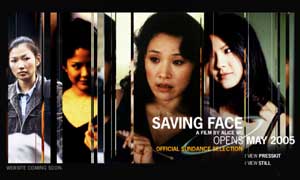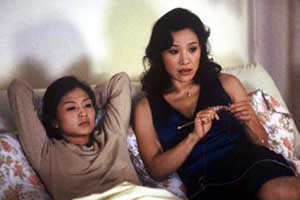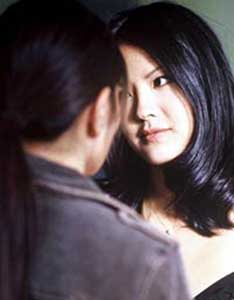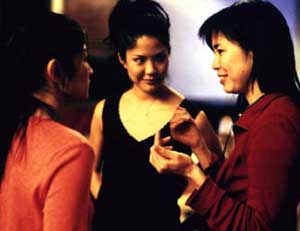-
- Navajo Nation Council overrides veto of same-sex marriage ban
- Audit: Atlanta Boy Scouts inflated numbers of African-Americans
- Former N.C. soldier sues to ease transition from man to woman
- Trans-inclusive hate crimes bill introduced in House
- ‘It doesn’t have to be tragic’
- Rare sexually transmitted disease reported in Boston
- National News Briefs
- World News Briefs
Arts & Entertainment
Face to ‘Face’
An interview with Alice Wu and Joan Chen of ‘Saving Face’
Published Thursday, 09-Jun-2005 in issue 911
Alice Wu, an out lesbian writer/director, is so enthusiastic about her debut film, Saving Face, that it’s hard not to share in her excitement. How can you blame her? An official selection of both the Sundance and Toronto film festivals, Saving Face is about to open in select cities nationally, introducing her creation to an even larger audience. The story is of a mother and daughter, Ma (Joan Chen) and Wil (Michelle Krusiec), and the secrets (Wil is a lesbian and widowed Ma is pregnant by an unnamed father) that tear them apart, as well as keep them together. At turns sad, sweet and funny, Saving Face is a wonderful introduction to a promising filmmaker. I spoke with Ms. Wu and Ms. Chen at the Ritz Carlton in Chicago.
Gay & Lesbian Times: Saving Face is not only the title, but one of the central themes of the movie. Can you say something about what the cultural implications are of “saving face”?
Alice Wu: Often I think of it as more of an Asian notion, although the concept of it is very universal across many cultures. The way I understood it growing up is that there is this sense that what you present to the world may not be who you are inside, but there is a responsibility when you come from an immigrant community – even though I was born in the states, my parents were immigrants – so there was this sense of wanting to be the perfect citizen. On some level I’m representing all Chinese people to Americans, even though, technically, I’m an American. So, if you do anything to shame yourself, you’re not just shaming yourself, you’re shaming an entire community. Also, in terms of the film, Wil is a reconstructive surgeon who specializes in faces, and her mother works as an aesthetician at a salon, giving facials. There is that double entendre.
GLT: There are other recurring themes in the movie, including food as a means of demonstrating love.
AW: You can sort of see it in the dialogue, too. I think that most people don’t just come right out and say what they want or need. I get frustrated sometimes when I’m watching films and all the characters are speaking without subtext. I feel condescended to. I think that with these characters in particular, especially the mother and the daughter, they both clearly have wants and needs that they’re not expressing to each other. But you never doubt that they love each other. You can really see it with the mom, with the food she prepares, or even the Chinese community at those [social] dances. One of the things that I loved was that even though the music was wonderful and the food was so good, there is all this gossiping. That’s just part of the fun, and there is a warmth and affection there.
Joan Chen: Recently China has become rich, relatively speaking, but in the past hundred years, food was kind of scarce. So, to bring out food on the table is truly a happy thing. Every opportunity, if you want to celebrate or if there is a funeral, you bring food out.
AW: You never get Chinese people together and not have food be something that is available. I’m probably going to get skewered for this, but also, being gay, lesbian pot-lucks can be the worst food ever [laughs].
JC: [Laughing] Why is that?
AW: I think it’s the vegetarianism and the vegans [laughs].
JC: Chinese vegetarian dishes are very good.
AW: If I want a good meal, I don’t call up all my lesbian friends [laughs], I definitely call up all my Chinese friends. Of course, there is an important overlap with Asian lesbians, because you get both.
JC: You mean you get food and sex [all laugh].
GLT: I get the sense that part of saving face for a daughter is, if not marrying and starting a family, to at least have respectable professions such as Wil being a doctor and Vivian being a dancer. Do filmmakers and actress also qualify?
AW: No [laughs]. Now, they’re very proud.
JC: Actually, in Chinese culture, movie stars can make a lot of money in Taiwan and Hong Kong. All these really rich men would love to have mistresses who are movie stars, but they would never marry them. It’s not respectable.
AW: We should be clear that with that said, things are changing within the Asian-American community. But what Joan said is totally true. There is this bias that you want your kid to be – it used to be doctor or lawyer – now I think they want them to run their own company and be an entrepreneur. I think it has something to do with affluence. When you’re a recent immigrant, there is a sense that you need to find a respectable profession so that you can take care of your parents. I got my degrees in Computer Science. I spent years in software. I didn’t go to film school. This is sort of my funding my own little dream to learn about film to try to get this done. But the reality is that I would never have dreamed of majoring in English or film when I was in college. Not that my parents would have forbidden me to do it, I just would have never thought to ask.
JC: I think that the arts as a profession are considered selfish. You are doing it for self-expression, because you love to do it.
GLT: What about the concept of making art to better other people’s lives?
JC: It’s not your family’s immediate needs.
AW: I don’t think Chinese-American parents are going around saying, “I hope they make a film [to better the world].” In a lot of ways I think art is considered a luxury, at least in the communities I grew up in. As there is more affluence in those communities, those luxuries are more possible. So now, parents are coming up to me and saying that their kids want to be filmmakers. Wow! When did that happen? That’s excellent that their parents are so supportive. But I think it’s out of economic necessity. If you’ve struggled all your life so that your kids can go to college, I understand why they think that they don’t want their kids to go through the same struggle that they went through. You want their life to be easier. What if the famine comes? What if this or that comes? The artists are the first ones chucked out the door [laughs]. You don’t want that to happen to your kids. I don’t think this is a selfish act on the part of the parents.
JC: It’s better for the children, better for the family.
GLT: The issue of racism is also explored through Ma’s interactions with Wil’s African-American neighbor, Jay [Ato Essandoh], in the movie.
AW: For me, what I love about those scenes – it’s so funny because audiences love that scene when Jay and Ma are first at the table together. At the same time, if I’m sitting in [the] audience with mostly people of color, they think it’s hysterical. If I’m sitting in a mostly white audience, they still think it’s funny, they’ll laugh….
JC: …but there will be a nervousness.
AW: There’s a moment where they think, “Is this racist?”
GLT: There’s the whole political correctness thing.
AW: Right, which I totally understand. And then they laugh anyway. For me, that’s authentic. The mother’s not P.C. She’s going to say whatever she wants. What’s great is that they’re speaking in this other language so she feels like she can. Why I think so many people think it’s funny and real is because they’ve experienced it in their lives; they just don’t usually talk about it.
JC: Every race or every ethnic group sometimes talks about another group. We all do that, it’s just that in this country, in this environment, people are so nervous. They censor themselves again and again.
AW: It’s great that there is a racial awareness. But the reality is, in something like that [the movie], calling attention to it where it’s real actually helps you see the relationship spring up.
GLT: The coming out process is also central to the movie. Ma knows about Wil, having dropped in on her years earlier and catching her with someone, yet it is incomplete. Alice, was your coming out process this protracted?
AW: This is a fictional film, but it is true that everyone thinks the important moment is the one when your mom finds out, and it’s not, I don’t think. I think it’s the moment that the parent and the child decide to honestly deal with each other about it, which may happen as soon as you tell them about it, or it might not happen for years. People have said that they told their mom and she said nothing and acted like nothing happened for years. That is more real to me. This is not a story about when will this woman tell her mom. It’s a story about when will these two women drop their masks and really see each other.
GLT: Joan, when Wil comes out to Ma, Ma says “I’m not a bad mother.” As a mother yourself, how did you feel about that type of reaction?
JC: My own [liberal] upbringing and background is slightly different from Ma’s. But I played it as coming from love, because her daughter’s chance for happiness is shot. A good mother raises a daughter and provides her with a chance for happiness. To Ma, she is not going to be happy, her life is going to be hard. I think that’s what saddened her and didn’t want to accept that at all.
AW: I think that [when Ma says] “I’m not a bad mother” [she] is basically saying, “You are a reflection of me.” She is also worried about how this reflects on her.
JC: I do think for the mother, the most important thing for a mother is the happiness of her children. If you’re not “normal,” you are not going to be happy. Of course it reflects badly on the mother. “I raised an abnormal child.”
GLT: There seems to be a revival of queer movies at this time. How does it feel to have your film be caught up in this current wave?
AW: It’s great. I had no idea I was caught up in a wave of queer films.
JC: [Laughs]
AW: Only because I’ve been so busy, but why not? I look forward to seeing all the other ones.
GLT: What do you each want people to come away with after seeing Saving Face?
AW: I want them to come away with this feeling that – no matter who they are, whether they are gay or straight, or whatever their cultural make-up is – that if there is something that they secretly wanted, whether it’s this feeling that they could actually have that great love or whatever it is, that it’s never too late to have that. I want them to leave the theater feeling a sense of hope and possibility .
|
|
Copyright © 2003-2025 Uptown Publications





